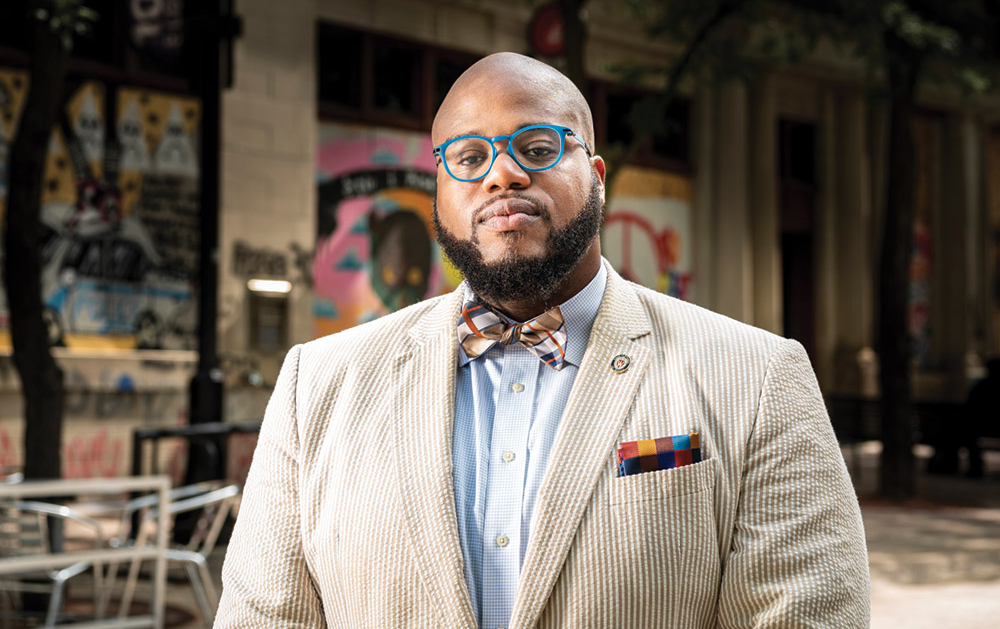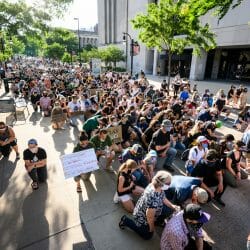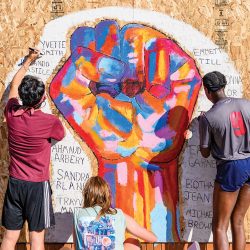‘Systemic Racism Does Indeed Exist’
LaVar Charleston MS’07, PhD’10 believes UW–Madison is uniquely positioned to lead at this crucial moment.
Outrage. Pain. Exhaustion. LaVar Charleston MS’07, PhD’10 went through an emotional wringer in May when he learned of George Floyd’s death under a Minneapolis police officer’s knee. For an African American man, the scenario felt chillingly familiar.
“If you’re in the Black community, you know someone this has happened to: discrimination, abuse, and violence at the hands of police,” says Charleston, associate dean for equity, diversity, and inclusion and clinical professor of Educational Leadership and Policy Analysis at the UW–Madison School of Education. “You envision yourself, your father, your nephews, your kids, your grandparents in that space.”
Charleston is inspired by the Black Lives Matter protests that arose after Floyd’s death. In the midst of tragedy, he sees hope — and believes UW–Madison is uniquely positioned to lead at this crucial moment. “We can change the world, and we must change the world,” Charleston insists. “If we don’t do it, who will?”
How did George Floyd’s death affect you personally?
It recalled a time when I got pulled over for speeding. A gun was pointed at my head, and the officer’s hand was shaking. Whenever a policeman drives by me or pulls me over, still, my heart begins to race a bit. Even with a PhD, I’m looked at as a criminal, and it has to be because of my color. No one deserves to be treated like this, or to be governed by fear of the ones who pledged to protect and serve you. This is a constant reminder that systemic racism does indeed exist.
How do you define the Black Lives Matter movement?
It’s a response, an objection, and a refusal to accept state-sanctioned violence and anti-Black racism, which has permeated society for as long as we can remember. The movement connects Black people and others around the world with a shared desire for justice, for freedom, for civil rights and human rights.
How would you address objections to the Black Lives Matter protests?
Protests are actions that express disapproval. No matter how you do it, there’s opposition. You can peacefully protest in a place like Selma, as Martin Luther King did, and you got water hoses and dogs and death. You can peacefully protest as Colin Kaepernick did [in the NFL], and now you’re not a patriot. And so, when do you hear us? Protesting was how we broke away from Britain and became a nation, right? Much of our nation’s legislation regarding human and civil rights came in part by protest. Our First Amendment rights sanction our protest. It is what helps to define us as American.
What’s wrong with our system of policing?
We need police. My brother, who I love, is a 23-year veteran of the Detroit police department. But every time something like this happens, it extends the gap in trust. We have a whole system of policing that sweeps this violence under the rug, and we continue to protect those who are causing harm. It’s creating a splinter at a time when we’re trying to build unity.
Policing should be truly seen as a service organization. It should be seen as a special calling that merits significant training, understanding, and empathy. What’s wrong with our system of policing is it is often the opposite, stoking and promoting fear, resentment, hate, prejudice, bias, and other symptoms of systemic racism that are interwoven into the fabric of our country. A deeper look into some foundational goals and principles of policing in our country clearly demonstrates the original intent to preserve the slavery system. It seems in current policing, we still hold fast to some of these original ideals.
How are the protests transforming our world?
We can’t deny systemic racism anymore. That’s the awakening some folks are having, including Fortune 500 companies. It is not enough to purport to not be racist. We must actively be anti-racist to reshape our actions to oppose racism. We are an increasingly diverse global society, so even from an economic standpoint, it does not pay to be racist. In addition to hurting true equity, diversity and inclusion, it will hurt your bottom line. If you do not have the capacity to interact effectively with diverse teams, then you can’t be successful in today’s society.
What is UW–Madison’s role at a time like this?
It’s important that the university affirm Black lives among our students, faculty, and staff. Because of the Wisconsin Idea, which is that education should influence people’s lives beyond the boundaries of the classroom, we should be leading the way in the state of Wisconsin and in the broader society with an inspiring and permeating vision for anti-racism, for social justice, for equality, for diversity, for inclusion. And we’re working toward that, so I’m encouraged.
What is the UW doing?
I’m seeing the campus commit to hiring more folks of color, and to creating affinity groups so people can come together and talk about these issues. I’m seeing the chancellor tell folks of color that they matter, which is a strong statement that must be backed up by action and accountability. We have a provost who is working with the deans to create a sense of belonging in the schools and colleges. The office of admissions has a whole team of recruiters, led by a new assistant director, that is focused on diversifying the campus. And schools and colleges are implementing diversity leaders like myself, as well as programs and initiatives that help equip folks with tools to be anti-racist.
The increased interest and, importantly, action give me hope. We’re taking advantage of this moment to create more equitable working and learning environments.
Why is change essential right now?
The liberties for one in this country must be the liberties for all. If not, then we’re a living lie. We’re not true to ourselves. So until everyone is free, none of us are free. And that’s what the Black Lives Matter movement is about.
Published in the Fall 2020 issue




Comments
No comments posted yet.